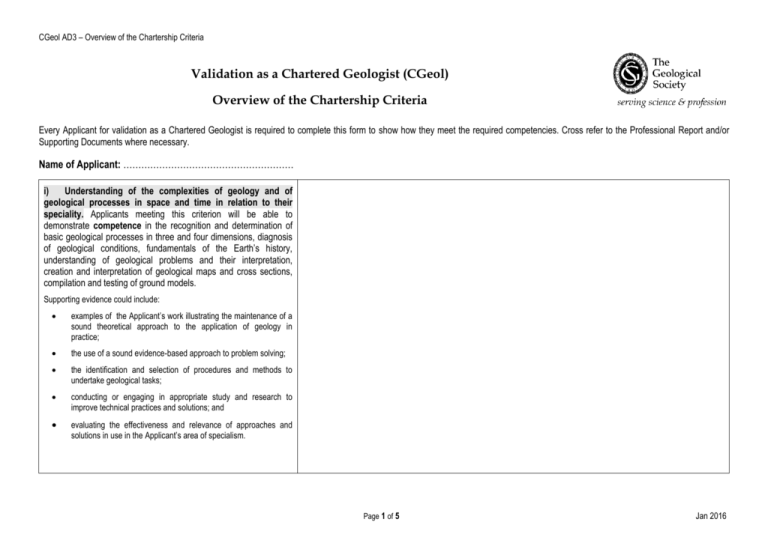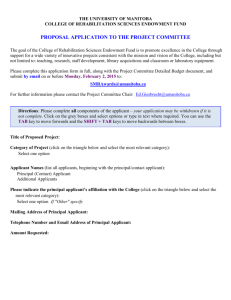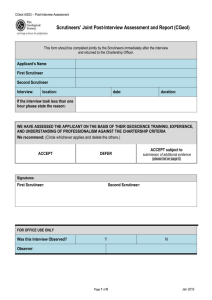vii Competence in their area of expertise. Applicants meeting this
advertisement

CGeol AD3 – Overview of the Chartership Criteria Validation as a Chartered Geologist (CGeol) Overview of the Chartership Criteria Every Applicant for validation as a Chartered Geologist is required to complete this form to show how they meet the required competencies. Cross refer to the Professional Report and/or Supporting Documents where necessary. Name of Applicant: ………………………………………………… i) Understanding of the complexities of geology and of geological processes in space and time in relation to their speciality. Applicants meeting this criterion will be able to demonstrate competence in the recognition and determination of basic geological processes in three and four dimensions, diagnosis of geological conditions, fundamentals of the Earth’s history, understanding of geological problems and their interpretation, creation and interpretation of geological maps and cross sections, compilation and testing of ground models. Supporting evidence could include: examples of the Applicant’s work illustrating the maintenance of a sound theoretical approach to the application of geology in practice; the use of a sound evidence-based approach to problem solving; the identification and selection of procedures and methods to undertake geological tasks; conducting or engaging in appropriate study and research to improve technical practices and solutions; and evaluating the effectiveness and relevance of approaches and solutions in use in the Applicant’s area of specialism. Page 1 of 5 Jan 2016 CGeol AD3 – Overview of the Chartership Criteria ii Critical evaluation of geoscience information to generate predictive models. Applicants meeting this criterion will be able to demonstrate competence in the acquisition, observation and description of geological data, appreciation of the limitations of and conditions under which the data were collected or how they arrived in their present state, and an assessment of certainty/uncertainty. The geological data may be acquired in the field in one or more of the following ways: at outcrop, by intrusive investigations (boreholes, pits, etc), by geophysical/geotechnical surveys or other remote sensing. It may also be experimental data (including laboratory-based investigations or computer modelling). Supporting evidence could include: examples of work carried out and interpretations made, including the reasoning used; contribution to the development of solutions; the level of decisions undertaken in the workplace; output reports and publications; and contribution to evaluation of the outputs. Page 2 of 5 Jan 2016 CGeol AD3 – Overview of the Chartership Criteria iii Effective communication in writing and orally. Applicants meeting this criterion will be able to demonstrate competence through the material presented in the professional report and documents accompanying the application together with the impact the applicant makes at interview. Written Reports are the primary evidence of written communication skills. Template reports should be used here sparingly, if at all Supporting evidence could include: materials which demonstrate communication skills both within the workplace and also socially and outside the workplace. Assessment of this criterion will be based on the whole of the application for Validation as a Chartered Geologist, including supporting documents prepared by the applicant such as reports, correspondence and presentations (including any feedback). iv Competence in the management of Health and Safety issue and Environmental issues, and in the observance of all other statutory obligations applicable to the discipline or area of work. Supporting evidence of satisfactory attainment could include: records showing how H&S issues are managed as part of day to day work for the applicant and others; a summary of the Applicant’s H&S responsibilities; examples of implementation of H&S policies; responses to incidents (including near misses) and subsequent investigations and knowledge of Environmental legislation and environmental protection practice. The evidence should also demonstrate sound knowledge of sustainable development best practice and implementation and management of such practices Page 3 of 5 Jan 2016 CGeol AD3 – Overview of the Chartership Criteria v Clear understanding of the meaning and needs of professionalism including a clear understanding of the Code of Conduct and commitment to its implementation. Applicants meeting this criterion will be able to demonstrate an understanding of the need to meet deadlines, to behave professionally and ethically at all times in accordance with the Society’s Code of Conduct and must fully understand the requirements of the Code, giving relevant examples of its application in their professional actions, activities and decisions vi Commitment to Continuing Professional Development throughout their professional career. Applicants meeting this criterion will be able to demonstrate that they are committed to a programme of development of technical and professional skills for the work they undertake in order to enhance the skills available in pursuance of their career. In addition to providing an existing CPD record, Applicants are asked to describe their CPD aims and objectives and to give examples of specific CPD activities enabling them to meet these objectives. Applicants are required to submit at least one years’ CPD records (and preferably two or more) as part of their application (see Section 5.8 of the Society’s Regulation R/FP/02). Supporting evidence of satisfactory attainment could include: records of CPD through a formal reporting scheme supported by evidence of analysis of scientific and professional development needs; and actions taken to satisfy these needs, including critical review of how successful these actions were. Page 4 of 5 Jan 2016 CGeol AD3 – Overview of the Chartership Criteria vii Competence in their area of expertise. Applicants meeting this criterion will clearly define the areas of professional practice for which they claim competence at the level appropriate to their level of seniority. A clear understanding of the limits of their expertise is expected Supporting evidence of satisfactory attainment could include: relevant sections from job description and written examples of contributions to key tasks; examples of the Applicant’s role in project planning, organisation of tasks, use of people and resources, managing changing technical and project needs; written examples of personal contributions to key tasks; examples of preparing processes; and examples of projects for which they had responsibility for design, Implementation, interpretation of data collected and presentation of conclusions. and implementing quality-related Signature of Applicant: ………………………………………………………………… Date: ………………………………… Page 5 of 5 Jan 2016




